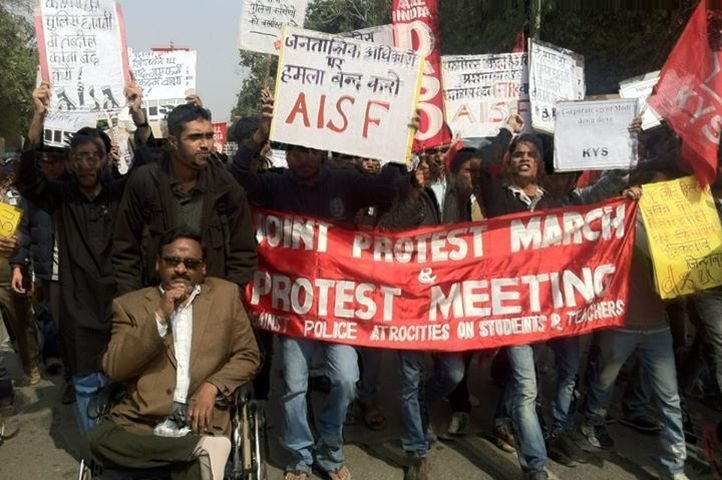GN Saibaba, a former Delhi University professor and activist for Tribal rights, has been wasting away in prison since he was arrested in September 2013. Arrested on the grounds that he was ‘an urban contact’ for Maoists, he has been held in prison without facing trial ever since. Saibaba is also 90% disabled and is thus confined to a wheel chair. On June 23, the Bombay High Court condemned the police for ‘working blindly’ and treating the ailing professor ‘like an animal’.
The court has ordered the police to take him to a private hospital for a medical check-up and allow his brother and wife to accompany him. The order was sent on June 17. However, activist Purnima Upadhyay informed the court that the police did not comply with the order and the professor’s health continues to deteriorate fast.

The police, however, are telling a different story. They claim the wife and brother were present during the check-up and even spent time with the doctor discussing the problems the professor is facing. The police also defended their decision to take him back to prison after the check-up, saying there was no pressing need to hospitalise him.
However, the court did not accept their word and said , ” You (state) allowed the family to meet him only for three minutes? A threat to security? Why are you behaving like this? That’s the way they behave? These agencies believe that when some work is entrusted to them, they should work blindly and treat Saibaba like an animal”.
Who is GN Saibaba?
Born in Andhra’s Amalapuram in 1967, Saibaba has known poverty first hand. He grew up in a home without electricity, with his father losing his farm land to money-lenders. He did not have a wheel chair until he came to Delhi in 2003. Prior to which he would have to crawl to get around.
A consistently stellar student, he got scholarships throughout his life, but the fee for his entrance test for masters in Hyderabad was paid by his wife, then girlfriend. He met his wife Vasantha at a coaching class and they fell in love over grade 10 math homework.
An avid reader, Saibaba practically finished all the books in the Amalapuram library. His favourite author is Kenyan Ngugi Wa Thiong’o whom he met at a seminar.
After finishing top of his university at SKBR College, Saibaba left Amalapuram and saw a train for the first time in his life. Later in life when he joined the All India People’s Resistance Forum (AIPRF), he travelled over 200,000 km to speak in support of liberation movements in Kashmir and the North East and campaign for Dalit and a divasi rights.

In the middle of his career, Saibaba had given up his PhD and become a full time activist for AIPRF. He fought for many years for the rights of those that didn’t have a voice, he championed the cause of tribals and fought for Dalits.
In Delhi, where he returned to academics, he started teaching at Ram Lal Anand College in 2003. In 2005, AIPRF became the Revolutionary Democratic Front (RDF) — accused of being a Maoist front. “We have an ideological understanding,” Times of India quoted Saibaba, “but no organizational linkages.” RDF’s members have been arrested before and it was banned in Andhra Pradesh last year. In Delhi, Saibaba organised fact-finding missions to Jharkhand, Kashmir, Assam and Manipur and completed his PhD.
Saibaba believes his arrest had a lot to do with his criticism of Operation Green Hunt (OGH). Started in 2009 to ostensibly counter Maoists, OGH quickly became known for killing off adivasis and clearing the land for mining instead. Activists of the operation were targeted by the state.
Saibaba is one of the many prisoners suffering in jail because they were wrongfully convicted of being Maoists. They are mistreated by the police, held in terrible conditions and in many cases denied bail. In this case, despite Saibaba being almost entirely crippled and extremely unwell, he is being denied bail.

















